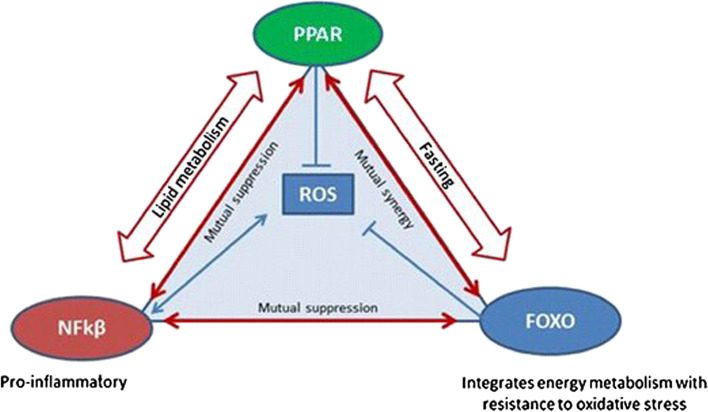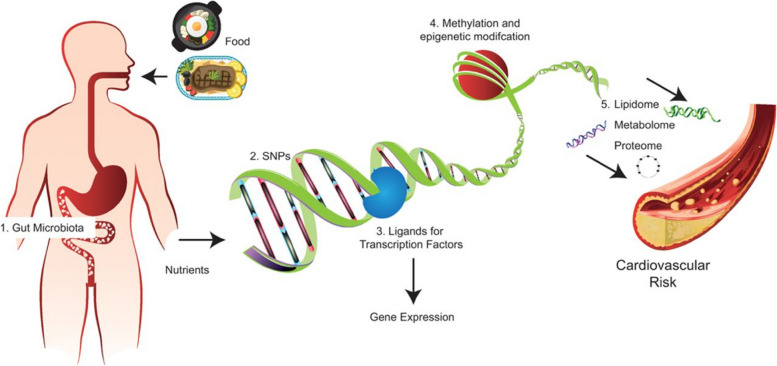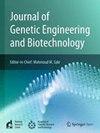营养基因组学和微生物组塑造个性化医疗的未来:一篇综述文章。
IF 2.8
Q3 Biochemistry, Genetics and Molecular Biology
Journal of Genetic Engineering and Biotechnology
Pub Date : 2023-12-01
DOI:10.1186/s43141-023-00599-2
引用次数: 0
摘要
长期以来,营养和基因之间的关系一直被暗示,有时甚至被明确地与某些疾病联系在一起。现在,经过多年的研究和偶然的发现,人们相信,这种被称为“营养基因组学”的关系,在各种情况下肯定是一个重要的因素。在这篇综述文章中,我们讨论营养基因组学,从基本定义和酶的功能开始,并以其与癌症的明显联系结束。饮食基本上就是我们每天吃的东西。所有进入我们消化道的东西最终都被分解成微小的分子和氨基酸。这些分子以谨慎的方式与我们的微生物群和基因组相互作用。例如,我们证明了适当摄入益生菌如何增强有益菌群,并可能长期缓解肠易激综合征和预防结直肠癌。我们还展示了富含叶酸的饮食如何对亚甲基四氢叶酸还原酶(MTHFR)功能至关重要,从而降低结直肠癌的风险。此外,我们还讨论了某些饮食与某些癌症的发展之间的关系。例如,红肉和加工肉与结直肠癌和前列腺癌密切相关,高盐饮食与胃癌密切相关,肥胖与乳腺癌密切相关。这些饮食的改变大大降低了这些癌症的风险,改善了许多其他癌症的预后。我们还研究了微量营养素如何在预防癌症方面发挥作用,如维生素a和C通过其抗氧化剂的功能发挥抗癌作用。此外,我们展示了叶酸如何通过增强蛋白质甲基化过程来防止DNA突变。最后,在系统回顾了无数关于癌症病因和预防的文章后,我们认为饮食应该是癌症预防和治疗计划的一个关键特征。在未来,健康的饮食和微量营养素甚至可以依次改变导致癌症的基因突变的可能性。它还将在促进治疗和改善诊断癌症的预后方面发挥作用。本文章由计算机程序翻译,如有差异,请以英文原文为准。


Nutrigenomics and microbiome shaping the future of personalized medicine: a review article
The relationship between nutrition and genes has long been hinted at and sometimes plainly associated with certain diseases. Now, after many years of research and coincidental findings, it is believed that this relationship, termed “Nutrigenomics,” is certainly a factor of major importance in various conditions. In this review article, we discuss nutrigenomics, starting with basics definitions and enzymatic functions and ending with its palpable association with cancer. Now, diet is basically what we eat on a daily basis. Everything that enters through our alimentary tract ends up broken down to minute molecules and amino acids. These molecules interact with our microbiome and genome in discreet ways. For instance, we demonstrate how proper intake of probiotics enhances beneficial bacteria and may alleviate IBS and prevent colorectal cancer on the long term. We also show how a diet rich in folic acid is essential for methylenetetrahydrofolate reductase (MTHFR) function, which lowers risk of colorectal cancer. Also, we discuss how certain diets were associated with development of certain cancers. For example, red and processed meat are highly associated with colorectal and prostate cancer, salty diets with stomach cancer, and obesity with breast cancer. The modification of these diets significantly lowered the risk and improved prognosis of these cancers among many others. We also examined how micronutrients had a role in cancer prevention, as vitamin A and C exert anti-carcinogenic effects through their function as antioxidants. In addition, we show how folic acid prevent DNA mutations by enhancing protein methylation processes. Finally, after a systematic review of myriad articles on the etiology and prevention of cancer, we think that diet should be a crucial feature in cancer prevention and treatment programs. In the future, healthy diets and micronutrients may even be able to successively alter the liability to genetic mutations that result in cancer. It also will play a role in boosting treatment and improving prognosis of diagnosed cancers.
求助全文
通过发布文献求助,成功后即可免费获取论文全文。
去求助
来源期刊

Journal of Genetic Engineering and Biotechnology
Biochemistry, Genetics and Molecular Biology-Biotechnology
CiteScore
5.70
自引率
5.70%
发文量
159
审稿时长
16 weeks
期刊介绍:
Journal of genetic engineering and biotechnology is devoted to rapid publication of full-length research papers that leads to significant contribution in advancing knowledge in genetic engineering and biotechnology and provide novel perspectives in this research area. JGEB includes all major themes related to genetic engineering and recombinant DNA. The area of interest of JGEB includes but not restricted to: •Plant genetics •Animal genetics •Bacterial enzymes •Agricultural Biotechnology, •Biochemistry, •Biophysics, •Bioinformatics, •Environmental Biotechnology, •Industrial Biotechnology, •Microbial biotechnology, •Medical Biotechnology, •Bioenergy, Biosafety, •Biosecurity, •Bioethics, •GMOS, •Genomic, •Proteomic JGEB accepts
 求助内容:
求助内容: 应助结果提醒方式:
应助结果提醒方式:


